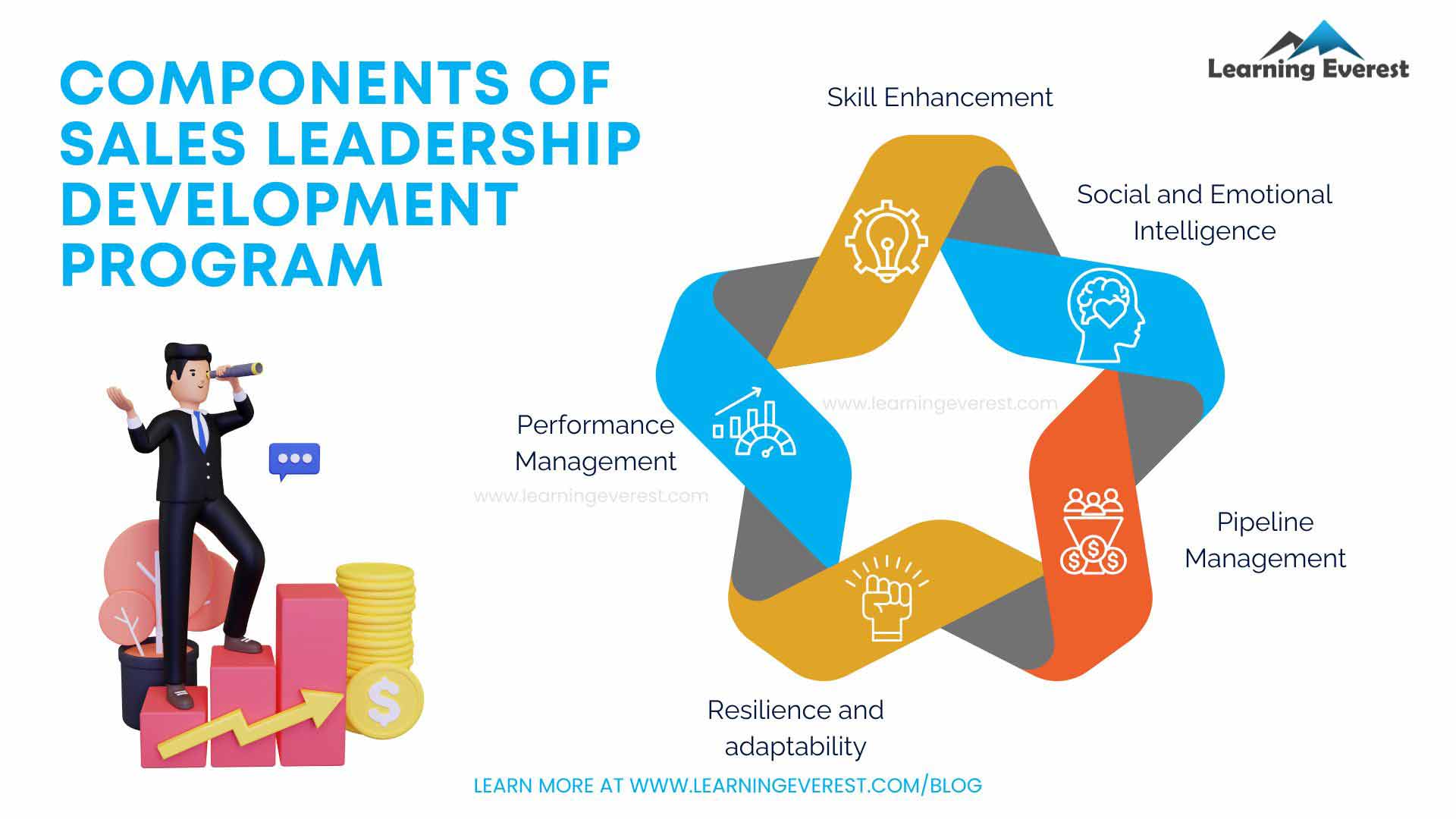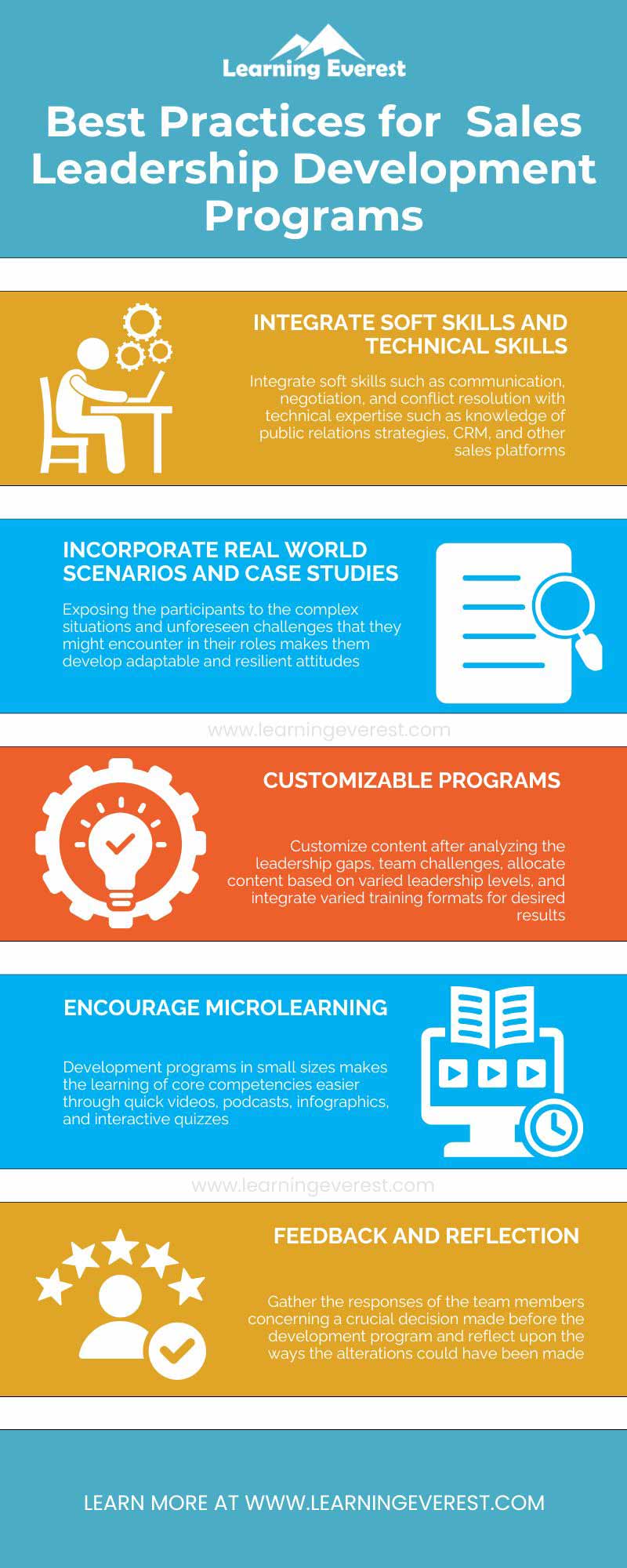The sales leadership development program is a vital investment amidst the increasingly competitive market challenges to guide high-performing sales teams. A successful sales leader is the backbone of thriving and dedicated sales teams, driving them constantly to attain goals. This blog offers insights on who needs a sales leadership development program, its key components, and the best practices in implementing the program.
Table of Contents
Who Needs Sales Leadership Development Program?
Sales leadership development programs are training workshops or other learning modes intended for professionals planning to improve specific skills needed to excel in their sales leadership roles. The program is beneficial for individuals in sales management roles such as sales managers, sales operations managers, regional sales managers, sales directors, market leaders, etc., and emerging leaders, entrepreneurs, start-up founders, and high-potential individuals aspiring for future sales leadership roles. Sales leadership development is crucial as “only 31% of sales managers possess strong confidence in their sales team’s ability to meet key business objectives.” (Source: Brooksgroup Sales Leadership Report, 2020).
Key Components of the Sales Leadership Development Program
The sales leadership development program covers different areas where sales leaders require improvement to effectively guide and motivate their teams. The programs can be executive sales leadership programs offered to senior-level leaders, sales coaching programs, strategic sales leadership programs, sales leadership boot camps, or certifications. However, the major components of the sales leadership development program are the same for all these programs. They are:

Components of Sales Leadership Development Program
Skill Enhancement
A sales leader requires various skills such as communication skills, decision-making, conflict resolution, problem-solving, strategic thinking, negotiation, mentoring, and coaching. Enhancement of these vital leadership skills is an integral component of the development program. These skills enable leaders to anticipate market shifts and adopt appropriate strategies for planning, setting, and attaining challenging goals. Moreover, by possessing mentoring and coaching skills, the leaders empower themselves to motivate their teams to perform best.
Social and Emotional Intelligence
Social Intelligence, developed by Edward Thorndike in 1920, refers to the ability to manage “one’s own emotions, and fit into a variety of social contexts.” (Source: Intelligent Change). This vital intelligence can be improved in sales leaders by providing training to elevate their active listening and conversational skills and promoting social awareness. Developing social intelligence equips leaders to handle diverse personalities in employees, clients, and customers, encourage teamwork, and foster empathy.
Emotional Intelligence is the ability to manage and regulate one’s own emotions as well as that of others. It involves self-awareness, self-regulation, and empathy. Encouraging sales leaders to attend sessions on stress management, providing real-life sales scenarios, and reflection exercises contributes to building emotional intelligence.
Pipeline Management
A sales pipeline is “a visual representation of the steps a potential customer goes through, from initial contact to closing the deal.” The stages involved in a sales pipeline are prospecting where the potential customers are identified, lead qualification, initial contact, proposal, negotiation, and closing. A critical focus area of sales leadership development includes training the sales leaders to build, identify, and oversee the stages of the pipeline. According to the Gartner Report, in the year 2022, “72% of Chief Sales Officers (CSOs) marked improving pipeline creation as their top priority.” Development programs aid the leaders and sales representatives achieve this target.
Resilience and Adaptability
As businesses encounter different challenges and rapid changes at different levels, it is vital for sales leaders to be resilient and adaptable to the situations. Through the sales leadership development program, the participants are equipped to stay motivated, build perseverance and positivity, strategies to respond to market shifts, handle tough sales cycles, and bring innovative solutions for fostering sales growth.
Performance Management
Analyzing and managing the sales performance of the employees and the team is essential as a leader. Development programs focused on goal-setting, interpreting data, and effective employment of CRM and other performance management tools contribute to the long-term success of the sales teams. CRM platforms are essential tools that track customer interactions, communicate metrics, and evaluate team performance. Through sales leadership development programs, participants master the expertise to enhance overall performance.
Best Practices for Effective Sales Leadership Development Programs
Sales leadership development programs prepare individuals to face challenges and lead with an impact. When implementing development programs aimed at driving optimum sales excellence, organizations can adopt certain best practices for maximized outcomes. Let’s evaluate the best practices and how they benefit the training.
Integrate Soft Skills and Technical Skills
Sales leadership development programs that balance the enhancement of soft skills and technical skills reap optimum outcomes. As sales leaders require both skills such as communication, negotiation, and conflict resolution as well as technical expertise such as knowledge of public relations strategies, CRM, and other sales platforms, development programs should emphasize the integration of both. This integration equips the leaders to impart insights while motivating their teams.
Incorporate Real-World Scenarios and Case Studies
As trainers and managers, possessing the theoretical knowledge of different skills and pipeline management is not enough. To maximize the outcomes, the development programs can adopt a practical approach by incorporating real-world scenarios and case studies. This strategy exposes the participants to the complex situations and unforeseen challenges that they might encounter in their roles making them develop adaptable and resilient attitudes.
Customizable programs
Similar to employee training programs that require customized content depending on the learners, sales leadership development programs yield the best outcomes when the courses are customized after analyzing the leadership gaps and team challenges, allocating content based on varied leadership levels, and integrating varied training formats offer the desired results. This ensures that the specific needs of professionals as well as the organizational goals are sufficiently met.
Encourage Microlearning
Microlearning is a training delivery method involving chunking of information into small-bite-sized formats for maximized retention. The participants, being engaged with multiple responsibilities find the development programs in small sizes beneficial. This makes the learning of core competencies easier through quick videos, podcasts, infographics, and interactive quizzes that convey practical insights.
Feedback and Reflection
The development programs promoting feedback and reflective practices foster a culture of continuous improvement. Regarding feedback, leaders can gather the responses of the team members concerning a crucial decision made before the development program and reflect upon the ways the alterations could have been made. The courses can offer structured reflection sessions by encouraging the participants to journal their ideas, discuss their thoughts on case studies with peers, and ponder upon alternative solutions. This strategy equips leaders to be competent to face workplace challenges and drive sales success.
Conclusion
Intended for individuals in sales management roles, sales leadership development programs provide specific skills needed to excel in sales leadership roles. The key components of the sales leadership development programs are skill enhancement involving both soft skill and technical expertise, social and emotional intelligence, pipeline management, resilience and adaptability, and performance management. For organizations to get maximized outcomes from development programs can implement certain best practices such as integrating soft skills and technical skills, incorporating real-world scenarios and case studies, customizable programs based on the participant and organizational goals, encouraging microlearning, and reflective practices. To improve sales and profitability, organizations can offer sales leadership development programs at regular intervals to high-potential employees and existing leaders.
Infographic

Best Practices for Sales Leadership Development Programs
Knowledge Check!
Frequently Asked Questions (FAQs)
What is a sales leadership development program?
A sales leadership development program is a training workshop or other learning mode intended for professionals planning to improve specific skills needed to excel in their sales leadership roles.
Who needs a sales leadership development program?
The program is beneficial for individuals in sales management roles such as sales managers, sales operations managers, regional sales managers, sales directors, market leaders, etc., and emerging leaders, entrepreneurs, start-up founders, and high-potential individuals aspiring for future sales leadership roles.
What are the key components of sales leadership development program?
The key components of the sales leadership development programs are skill enhancement involving both soft skill and technical expertise, social and emotional intelligence, pipeline management, resilience and adaptability, and performance management.





